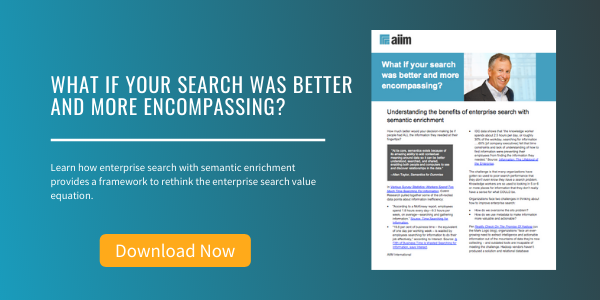
12 Recommendations For Smarter Search Capabilities
Our Search and Discovery: Exploiting Knowledge and Minimizing Risk research study revealed an interesting gap between intention and adoption for enterprise search.
On one side, the intent is there. Over 70% of the organizations we polled reported that search was "vital or essential" to their business.
But, the reality shows a gap in adoption. The respondents of this same study also reported only 18% have cross-repository search capabilities, and 58% show "little or no" signs of search maturity.
Clearly, organizations understand the power of enterprise search, yet a gap in adoption still remains. We've been thinking about some ways for organizations to be more effective in deploying search technologies. Below is a list of our recommendations on how to bridge this gap.
-
Set out a strategy for search that recognizes its importance for both information exploitation and information governance.
-
Agree where responsibility for search should lie. If you have an Information Governance Committee or Chief Information Officer, ensure that search is on their agenda, perhaps by creating a Knowledge Management Steering Group – or consider creating a Head of Knowledge Management.
-
Audit existing search tools within the organization. Establish what specific search needs there are within each department, and how well they are being met.
-
Evaluate the search capability of your ECM system(s), and whether they can be optimized or tuned for better results
-
Look to connect your ECM system search to other repositories to provide a single-point search portal.
-
If your ECM system does not provide a strong search tool, is not readily extensible to other repositories, cannot support mobile access, or does not provide the transparency and tune-ability you need, make the business case for a dedicated search product.
-
If you do not have the in-house expertise to support and tune your chosen search tool(s), consider specific training or help from a specialist consultancy.
-
Include end-user training in search techniques in order to maximize the benefits of your search tools.
-
Evaluate your ability to respond in a timely manner to a legal-discovery, FOI, compliance, or audit request across the relevant repositories, particularly email.
-
Ensure that you have a robust hold mechanism across each repository, and look at your IT support for the downstream review process.
-
Consider specific e-discovery or litigation management products to manage the workflow for pre-trial.
-
Look to use content analytics or predictive coding to speed up the review cycle.
About John Mancini
John Mancini is the President of Content Results, LLC and the Past President of AIIM. He is a well-known author, speaker, and advisor on information management, digital transformation and intelligent automation. John is a frequent keynote speaker and author of more than 30 eBooks on a variety of topics. He can be found on Twitter, LinkedIn and Facebook as jmancini77. Recent keynote topics include: The Stairway to Digital Transformation Navigating Disruptive Waters — 4 Things You Need to Know to Build Your Digital Transformation Strategy Getting Ahead of the Digital Transformation Curve Viewing Information Management Through a New Lens Digital Disruption: 6 Strategies to Avoid Being “Blockbustered” Specialties: Keynote speaker and writer on AI, RPA, intelligent Information Management, Intelligent Automation and Digital Transformation. Consensus-building with Boards to create strategic focus, action, and accountability. Extensive public speaking and public relations work Conversant and experienced in major technology issues and trends. Expert on inbound and content marketing, particularly in an association environment and on the Hubspot platform. John is a Phi Beta Kappa graduate of the College of William and Mary, and holds an M.A. in Public Policy from the Woodrow Wilson School at Princeton University.



